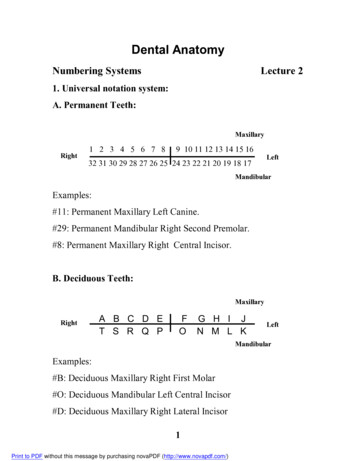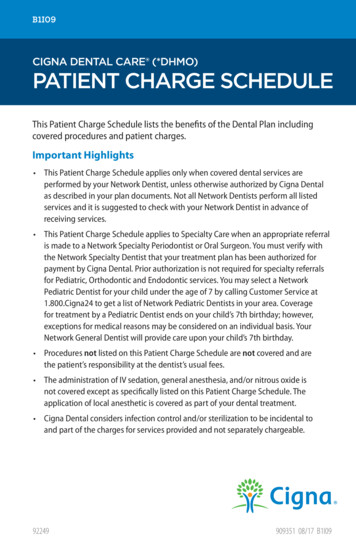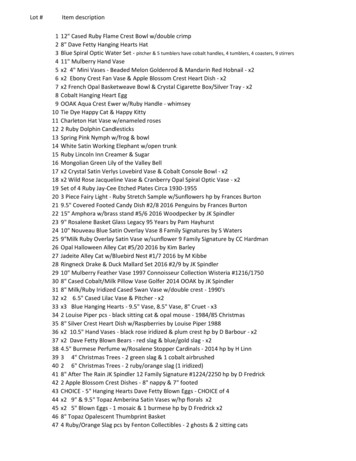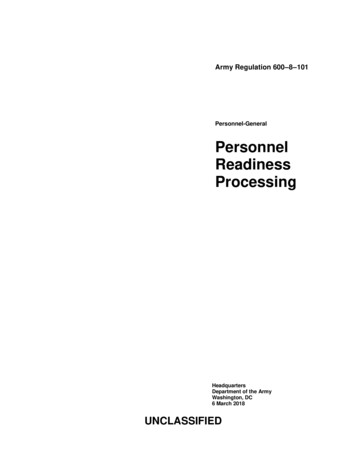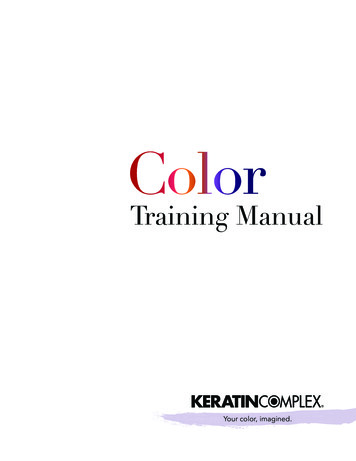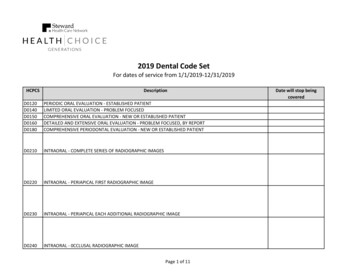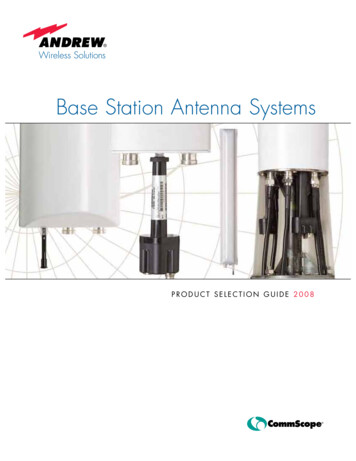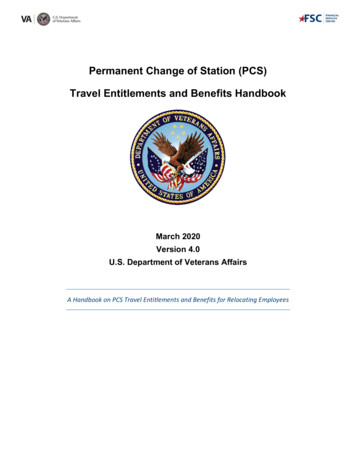
Transcription
Permanent Change of Station (PCS)Travel Entitlements and Benefits HandbookMarch 2020Version 4.0U.S. Department of Veterans AffairsA Handbook on PCS Travel Entitlements and Benefits for Relocating Employees
Revision tial CreationPamela Cash2/22/20192.0Format UpdateJoy Owen5/6/20193.0Updated Moving Company Information and PhoneNumbersPCS Editor3/3/20203.1Updated WTA information per New FTR guidelinesChrissi Bishaw3/25/20204.0Updated All Tax information for relocationsChrissi BishawUnited States Department of Veteran AffairsFinancial Services Centerhttp://www.fscdirect.fsc.va.gov/pcs.aspPCS Travel HandbookiiMarch 2020
Contents1.Introduction. 51.1. PCS Contact Information. 61.2. A Few Important Definitions . 61.2.1. Spouse . 71.2.2. Children . 71.2.3. Dependent Parents . 71.2.4. Dependent Brothers and Sisters. 72.Identifying Your Entitlements . 82.1.2.2.2.3.2.4.2.5.2.6.2.7.3.Understanding the PCS Process . 133.1.3.2.3.3.3.4.3.5.4.Preparing for your PCS Move . 13Completing Your Relocation and Paying for PCS Expenses . 14Travel Advances . 15Requesting an Extension of the PCS Process . 16Closing out your PCS Move . 16Taking a House-Hunting Trip Before Your Move. 184.1.4.2.4.3.4.4.4.5.5.Defining PCS . 8Determining Your Relocation Type and Allowances . 8New Appointee Entitlements . 9Transferee Employee Entitlements . 9Understanding Special Relocation Circumstances . 11Married Couple’s Transfer when Both Individuals are Employed by the Government . 11SES Last Move Home . 11Determining Your Eligibility to Take a House-Hunting Trip. 18Transportation. 19Lodging, Meals, and Incidental Expenses . 20Lump Sum Method . 20Actuals – Standard CONUS Rate . 20En-route Trip . 225.1. Traveling by Common Carrier. 225.2. Traveling by POV . 235.3. Identifying Allowable Per Diem Expenses for En-route Travel . 246.Miscellaneous Expense . 257.Staying in Temporary Quarters . 277.1.7.2.7.3.7.4.Using the Actual Expense Method . 28Maximum Reimbursement Amounts . 29Interruptions. 30Using the Fixed Rate Method (Lump Sum). 30PCS Travel HandbookiiiMarch 2020
8.Resolving Your Unexpired Lease . 329.Real Estate (Sale and Purchase) . 339.1.9.2.9.3.9.4.Home Sale Program - Buyer Value Option (BVO) . 33Identifying Reimbursable Expenses . 34Identifying Non-Reimbursable Expenses . 35Home Purchase . 3610. Household Goods . 3710.1. Self-Shipment (Do it yourself move) . 3810.2. Split Shipment Real-World Example . 3810.3. Temporary Storage of Your Household Goods . 3911. Understanding the Tax Implications of Your Move . 4012. Filing for Reimbursement . 4213. FTR Frequency Asked Questions (FAQ). 4314. PCS Top Frequently Asked Questions (FAQ). 48Appendix A.Acronyms . 51Appendix B.Home Purchase Fact Sheet . 52Appendix C.PCS Forms . 54Appendix D.PCS Transferee Expense Submission Checklist . 60Appendix E.PCS New Hire and Last Move Home Expense Submission Checklist . 64Appendix F.Knowledge Check Questions . 67PCS Travel HandbookivMarch 2020
FSC PCS TravelPermanent Change of Station Handbook1. IntroductionThe Corporate Travel & Charge Card Services (CTCCS) – PCS Travel Office developed this handbook tohelp Relocating employees understand the relocation process and provide information on theirentitlements, the Travel Authorization and claims process. This handbook explains the basic process of arelocation process and steps.The Permanent Change of Station (PCS) Travel Section is located at the VA Financial Services Center(FSC) in Austin, Texas. We recognize relocation can be a very stressful event for employees and theirfamilies. Making your relocation a success is our goal and we are committed to providing you world classcustomer service during your move.Relocation entitlements are authorized in accordance with the Federal Travel Regulations and VA TravelPolicy. The entitlements will help lessen some of the financial burden of relocating, but thereimbursements will not necessarily cover 100% of the expenses the employee may incur. Taxes willbe withheld from all reimbursements. Effective January 1, 2018 all relocation expenses are taxableallowances to the employee. Please note that this is not a VA standard form. “Chapter 302 — Relocation Allowances of theFTR”, (41 Code of Federal Regulations 302 or 41 CFR 302) contains the actual rules forrelocation of Federal civilian transferees. The VA Travel Policy, Financial Policy Volume XIV,Chapter 8, further defines the specific rules for PCS VA relocations. According to the Civilian Board of Contract Appeals (CBCA), the Government is not bound bythe erroneous advice, errors, and omissions of its officials even when the employee has relied onthis advice to his/her detriment. Erroneous travel orders, reflecting mistaken assumptions on thepart of authorizing officials, cannot obligate the Government to expend monies contrary toregulation. In addition, neither erroneous advice given by a Government employee nor erroneoustravel orders can create a right to reimbursement in excess of statutory and regulatoryentitlements. E.g., John J. Cody, GSBCA 13701-RELO, 97-1 BCA ¶ 28,694 (1996) Per the Tax Cuts and Jobs Act signed into law on 12/22/17, all PCS relocation expenses paid tothe employee or on behalf of the employee is considered taxable income to the employee andrecorded on LES statements and on W-2’s. Effective January 1, 2018 all relocation expenses are taxable allowances, which include (butnot limited to): House hunting trip (HHT) Temporary Quarters (TQ) Miscellaneous ExpenseAllowance (MEA) Withholding Tax Allowance (WTA) Relocation Income Tax Allowance(RITA) Do-it-yourself move (DITY) House Hold Goods (HHG) Transportation HHG Storage Real Estate direct reimbursement for sale Real Estate purchase reimbursement Leasebreaking En Route Lodging Meal portion of per diem Exception: Home sale program(s),Appraised Value Option (AVO) and Buyer Value Option (BVO), remain non-taxable.In the next section, you will find links relating to various aspects of your relocation, as well as a PCScontact list for your reference. If at any time during your relocation you need guidance or assistance,please contact us so we can make your relocation as smooth as possible.The VA adheres to FTR 302-2.7 which states if an employee attempts to defraud the governmentyou forfeit reimbursement and are subject under 18 U.S.C 287 and 1001 to one, or both of thefollowing: A fine of not more than 10,000 and or imprisonment for not more than 5 years.PCS Travel Handbook5March 2020
FSC PCS TravelPermanent Change of Station Handbook1.1. PCS Contact InformationHelp Desk Hoursof OperationClaimReimbursementsRITA QuestionsToll FreeDirectMonday – Friday8:00 a.m. to 4:00 p.m. CSTFSC Web 1985512-460-5700, Option 2System IssuesSystem Help Desk512-460-5700, Option 5Help with 3918Form512-460-5700, Option 3For 3918 HelpDeskCounseling Help512-460-5700, Option 2Fax Line512-460-5417Email nformation orSpecific QuestionsMailing AddressFinancial Services Center (0472)Attn: PCS Travel DivisionPO Box 149975Austin, TX 78772While this handbook should serve as your first source of information, your PCS Counselor can addressany questions or concerns you may have regarding special circumstances. Circumstances that meritcontacting your PCS Counselor immediately include, but are not limited to, the following: You discover an error on your Travel Authorization or other PCS paperwork. You believe you will require an extension of your time in temporary quarters. You are traveling to your new official station and become delayed.1.2. A Few Important DefinitionsTo apply this handbook to your move, you should be aware of three important definitions: The term Continental United States (CONUS), refers to the 48 contiguous states within theUnited States and the District of Columbia.PCS Travel Handbook6March 2020
FSC PCS TravelPermanent Change of Station Handbook The term Outside the Continental United States (OCONUS), for the purposes of this handbookonly, refers to the following non-foreign areas: Alaska, Guam, Hawaii, Pacific Islands, PuertoRico, American Samoa, and the U.S. Virgin Islands. The terms family members and immediate family refer to any of the following members of yourhousehold at the time you report to your new official station:1.2.1. Spouse In cases of common law marriage, the federal government recognizes common law marriages ofpartners of opposite and same sex when these unions meet the state-established eligibilityrequirements. A divorced or legally separated spouse is not an immediate family member and does not qualifyfor any entitlements.1.2.2. ChildrenThis includes stepchildren, adopted children, adopted grandchildren, legal minor wards, or otherdependent children under your or your spouse's legal guardianship) of you or your spouse that meet oneof the following two conditions: Under the age of 21 and unmarried; or Physically or mentally incapable of self-support, regardless of age. Children under age 21 who are away at school (e.g., college) are generally considered dependentsif the employee or spouse can properly claim them as dependents on his /her taxes. In addition, achild who is under joint legal and physical custody of the employee and former spouse may beconsidered a member of the employee’s household if residing there more than 50% of the time. Ifthere is equal joint custody of a child, determining whether the child is the employee’s dependentfor PCS purposes would require additional information.1.2.3. Dependent ParentsDependent parents (including step-parents and legally adoptive parents) of you or your spouse.1.2.4. Dependent Brothers and SistersDependent brothers and sisters (including step-siblings and legally adopted siblings) of you or yourspouse that meet one of the following two conditions: Under the age of 21 and unmarried; or Physically or mentally incapable of self-support, regardless of age.PCS Travel Handbook7March 2020
FSC PCS TravelPermanent Change of Station Handbook2. Identifying Your EntitlementsThis handbook is designed to guide relocating employees through the PCS process. In this chapter, weprovide guidance on how to determine your relocation type. The figures and tables included in thischapter will help you identify the entitlements that apply to your move so that you can reference theappropriate chapters of the handbook throughout the relocation process.This handbook supplements, but does not replace, the policy included in the FTR.1 Employees should contacttheir PCS Coordinators for guidance on situations not covered in this handbook or access the regulations directlyusing the following links: FTR - www.gsa.gov/federaltravelregulation VA Travel Policy - VolumeXIVChapter08.pdf2.1. Defining PCSBefore researching your relocation type and entitlements, it is important to define PCS travel as comparedto other types of official travel. While this section includes guidance to help you distinguish among thedifferent types of official travel, the handbook only addresses PCS entitlements. Employees looking forguidance temporary duty (TDY) travel or local travel should consult other resources. The table belowdefines the types of official travel that individuals conduct on behalf of the Service and where employeescan find guidance on each type of travel.Table 1. Types of Official TravelTravel TypeDefinitionGuidancePCS TravelTravel required as part of an employee's permanentThis handbook FTR Chapter 302relocation to a new official duty station, including househunting trips and en-route travel.To qualify for PCS entitlements as a transferee, the newduty station must be 50 miles farther from the employee’sprimary residence than the old duty station.TCS TravelRelocation to a new official station for a temporary periodof six to 30 months while performing a long- termassignment and subsequent return to the previous officialstation after completing that assignment. A TCS is analternative to remaining in TDY travel status for anextended period.2.2. Determining Your Relocation Type and AllowancesYour entitlements and allowances for relocation are determined based on your type of PCS, which theFTR divides into two main categories: New Appointee. Transferred Employee.PCS Travel Handbook8March 2020
FSC PCS TravelPermanent Change of Station Handbook2.3. New Appointee EntitlementsA new appointee is an individual employed with the federal government for the very first time, anemployee returning to the federal government after a break in service, or a student trainee assigned to thefederal government upon completion of college work. Table below outlines the relocation expenses towhich you are entitled as a new appointee.Table 2. New Appointee EntitlementsReimbursable ItemsTransportation for you and your immediate family members to your new official station.An allowance for your lodging, meals and incidental expenses while traveling to your new official station. (Expensesincurred by family members are not reimbursable.)Transportation for, and temporary storage of, household goods belonging to you and your family members.Transportation of a mobile home or boat used as your primary residence instead of transportation of householdgoods.An allowance to cover a portion of the taxes you will incur because of your move.Extended storage of household goods belonging to you and your family members.A discretionary relocation expense you may be authorized to incur as a new appointee. Authorization ofthis additional entitlement requires approval by your Authorizing Official (AO). As part of your requestfor authorization, you must provide a justification of your need for the additional entitlement. Ifauthorized, the additional entitlement will be documented on your Travel Authorization (TA).Table 3. New Appointee Discretionary EntitlementDiscretionary ItemShipment of a POV.2.4. Transferee Employee EntitlementsThe FTR distinguishes among the following categories of transferred employees:Transfer Between Stations - Employees that are completing one of the following types of transfers: Transfer between official stations within CONUS. Transfer from a CONUS official station to an official station OCONUS. Transfer from an OCONUS official station to a CONUS official station. Employees transferring between official stations OCONUS.Return from OCONUS - Employees transferring from an OCONUS official station to place of actualresidence for separation (e.g., retirement).Senior Executive Service (SES) Last Move Home - SES career appointees making their last movehome for separation (e.g., retirement).PCS Travel Handbook9March 2020
FSC PCS TravelPermanent Change of Station HandbookTable 4. Reimbursable ItemsCategory 1 Transfer Between StationsCategory 2 Return from OCONUSCategory 3 SES Last Move HomeCategoryReimbursable Items123 Transportation for you and your immediate family to your new official station. An allowance for your lodging, meals, and incidental expenses while traveling to your newofficial station.An allowance for your immediate family members' lodging, meals and incidental expenseswhile traveling to your new official station. Transportation for, and temporary storage of, household goods belonging to you and yourfamily members.A payment to offset miscellaneous moving expenses. An allowance to cover a portion of the taxes you will incur because of your move. Reimbursement of certain expenses associated with selling your home. Extended storage of household goods belonging to you and your family members. Transportation of a mobile home or boat used as your primary residence instead oftransportation of household goods Reimbursement of certain expenses associated with settling an unexpired lease. Reimbursement of certain expenses associated with the purchase of a new primaryresidence.Table 5. Discretionary ItemsCategoryDiscretionary Items123 Shipment of a POV. House-hunting trip, including transportation, lodging, meals, and incidentals for you and yourspouse only. An allowance to cover lodging, meals, and incidental expenses incurred by you and yourfamily members prior to securing a permanent residence at your new official station (i.e.,temporary quarters subsistence). Use of a relocation services company to assist you in selling your house. Use of property management services.A discretionary relocation expense you may be authorized to incur as a transferred employee.Authorization of this additional entitlement requires approval by your Authorizing Official (AO). As partof your request for authorization, you must provide a justification of your need for the additionalentitlement. If authorized, the additional entitlement will be documented on your Travel Authorization.PCS Travel Handbook10March 2020
FSC PCS TravelPermanent Change of Station Handbook2.5. Understanding Special Relocation CircumstancesWhile most of the PCS moves completed by Service employees fall under one of the relocation typesestablished in the FTR, there are special circumstances that can impact PCS entitlements. In this section,we outline the requirements associated with the following situations. Married couple’s transfer when both individuals are employed by the Service; PCS move to or from a foreign country; SES last move home;2.6. Married Couple’s Transfer when Both Individuals areEmployed by the GovernmentIf your spouse is employed by the Service and both of you are authorized to perform a PCS to the sameofficial station, you must select one of the following two methods for reimbursement of your PCSexpenses:Method 1: Each employee receives separate allowances and may not be claimed as an immediate familymember.Method 2: One of the employed family members is designated the head of your household and the otheremployed family member is claimed as an immediate family member on the "head of household"employee's Travel Authorization.You should consider the following two items before selecting which method to use:The government will not reimburse duplicate expenses and you must sign a disclosure statement aspart of your Employee Service Agreement.Both transferring employees must provide the PCS Coordinator with the name(s) of the immediatefamily member(s) who will receive allowances under their Travel Authorization. Each immediatefamily member may only be claimed on one employee's Travel Authorization.Be sure to clearly communicate your preferred method of reimbursement to your PCS Counselor.2.7. SES Last Move HomeSES appointees considering a “last move home” entitlements for retirement should consider the followingspecial circumstances associated with this type of move: Your Authorizing Official (AO) is your approving official for move-related authorizations andexpenses. Your PCS Counselor will communicate the eligibility requirements associated with claiming “lastmove home” entitlements; note that you must be retirement eligible or within five years ofretirement eligibility. You must complete your move within six months of separating from the Service. You can file foran extension for up to two years, but the written request for extension must be submitted withinsix months of your separation date. You may choose any location within the United States as your “moving to” location if it is at least50 miles from the permanent duty station from which you are separating. Under the “last move home” option, you are not eligible for temporary quarters, a house-huntingtrip, or real estate entitlements.PCS Travel Handbook11March 2020
FSC PCS TravelPermanent Change of Station Handbook You are eligible for transportation and temporary storage of household goods, up to 18,000 netpounds (excluding packing materials); transportation of you and your immediate family to yournew residence; and per diem entitlements for you (not immediate family) while en-route. You may qualify for shipment of your POV. This is a discretionary entitlement subject to somerestrictions, including that the shipment must be at least 600 miles for a “last move home” withinCONUS.PCS Travel Handbook12March 2020
FSC PCS TravelPermanent Change of Station Handbook3. Understanding the PCS ProcessThe guidance in this chapter will help you understand the high-level requirements and expectationsassociated with obtaining PCS compensation. The “PCS lifecycle” can generally be broken down into thefollowing phases:Preparation: Research your entitlements, participate in counseling, and complete the requiredpaperwork.Relocation: Complete your move, incurring expenses and filing for reimbursement as appropriate.Close-Out: File your RITA and provide feedback on your experience.While these activities are a part of each employee’s PCS, the process and timeline vary based on thecircumstances of each relocation and the policies of each region / program. This is high-level guidanceonly; your PCS Counselor will provide more specific information on the timeframes and requirements foryour relocation during your counseling session.3.1. Preparing for your PCS MoveDuring the preparation phase, you should focus on obtaining the guidance you need to make informeddecisions about your relocation, and completing the required paperwork prior to incurring any relocationexpenses. Reviewing this handbook is a good first step for a successful transition. When your PCS 3819Coordinator reaches out to schedule your counseling session, he / she may also include additionalguidance documents or forms for you to review. Be sure to look over all the information provided beforethe counseling session so that you and your PCS Counselor can focus on discussing how the PCSentitlements apply to your move during that meeting.The below steps reflect the basic process of a Form 3036 Travel Authority, which begins when theemployee accepts the position and a 3918 is created by Human Resources. Please note, if there are anydelays in the process, the length of time to complete the process could take up to 30 days or more.Table 6. Steps for PCS MoveTo be eligible for reimbursement of PCS-related expenses under the FTR, you must complete these formsduring this phase:PCS Travel Handbook13March 2020
FSC PCS TravelPermanent Change of Station Handbook Employee Relocation Service Agreement Form. Form 3918 - Employee Relocation Allowance Data Sheet. VA Form 10091 Vendorizing. Upon completion of your 10091, please upload your signed form to your PCS Portal Account,under attachments. If you are a current VA employee with a PIV card please click on the SelfService Portal link below to also complete a Vendor Form in the new Employee Vendor FileWebform Self-Service Portal. A training video is located below Self-Service Portal link ifneeded. Please have both requests completed before your counseling appointment. Self-Service PortalOnce you participate in your counseling session and complete these forms, you will submit them to yourPCS Counselor, who will review them and obligate the funding for your move. Once your forms havebeen processed, your PCS Counselor will provide you with your Travel Authorization.Receipt of the approved Travel Authorization marks the end of the Preparation phase of the PCS process;at this point, you can incur relocation-related expenses in compliance with the approved TravelAuthorization.Important! Do not travel prior to your Travel Authority being approved because: Traveler won’t know which PCS benefits are approved, which could result in problems with PCSreimbursements. A travel advance cannot be processed without a travel authority (TA) Reimbursements may be denied if traveler occurred expenses prior to receiving travel authority. Ensures that the traveler is properly given a comprehensive PCS counseling before travel begins.3.2. Completing Your Relocation and Paying for PCSExpensesDuring this phase, you complete your actual relocation, incurring and obtaining reimbursement for PCSrelated expenses as documented in your approved Travel Authorization. Guidance on allowable expensesis explained by entitlement in the later chapters of this handbook.In general, it is your responsibility to cover the expenses incurred by you and your family throughoutyour move using a personal form of payment. Then, within five business days of completing each part ofyour move (e.g., house-hunting trip, en-route travel), you must submit a claim in the PCS Travel Portal(OF-1012) to claim reimburse
FSC PCS Travel Permanent Change of Station Handbook PCS Travel Handbook 7 March 2020 The term . Outside the Continental United States (OCONUS), for the purposes of this handbook only, refers to the following non- foreign areas: Alaska, Guam, Hawaii, Pacific Islands, Puerto Ric
